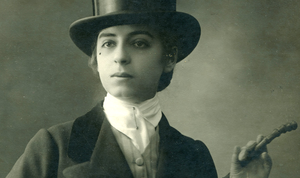
Channel 4's documentary Edward VIII's Murderous Mistress (rather like The Spice Girls you have to nickname them all to tell them apart, Murderous Mistress, Married Mistress, Divorced Mistress...) lifted the lid on both the playboy prince's sexual preferences (let's just say from Wallis Simpson's fondness for exacting neatness and scolding letters she might have been nicknamed Mrs. Grey had she lived now) and the lengths the establishment will go to to avoid scandal. Making you wonder if public nudity is the least of Harry's misdemeanours.
Following royal family tradition begun, at least, by Queen Victoria's son Albert "His two equerries eventually decided that this belated virginity should be put an end to. And so they set him up with a charming French prostitute called Paulette."
Everything changed and Edward wrote to a friend that "I don't think of anything but women now." On the search for his very own courtesan Edward met Maggie Meller at the Hotel Crillon.
Here is the strange thing about Maggie Meller, to me at least. And that is...I have never heard her name before. I have plenty of books on Belle Epoque, WW1 and 1920s Paris - biographies of Cora Pearl, La Paiva and Apollonie Sabatier and onward. But I have to admit this woman, slap bang (apologies) in the middle of my favourite era had eluded me. Why? I don't know, because it appears even before meeting the prince (who she names only as The Prince in her discreet memoirs) she'd had quite the life.
At 15 Marguerite gave birth to a daughter who she sent to live on a farm and at 16 she was forced to leave home and make a living selling her body. She was spotted by the owner of one of the opulent brothels in Paris and trained to become a very popular courtesan. To be a professional mistress is not the lazing around occupation many think it to be. As her grandson pointed out: "She had to have real strength of character to be able to do this kind of job...As a demimondaine. Or a companion. And she had to know absolutely everything about politics, as well as about theatre, economics and she had to combine it all."
| Marguerite lived on her rich lover's gifts, returning many of their presents to the shop in exchange for a third or so of their worth in cash. And why should she choose sentimentality over shewdness? When she met successful wine merchant Mr Meller in lieu of marriage (as a married Catholic he could not divorce) she took his surname to become the more respectable sounding Maggie Meller. | "She had to have real strength of character to be able to do this kind of job..." |
Ah, the letters. By 1918 Edward's affection for his woman cooled and he decided to drop Maggie Meller via the cunning method of ignoring her. Naturally she was furious at this slight and it seems threatened to make public Edward's replies to her 'wonderful letters!!!' Bugger. Edward wrote: "I'm afraid she's a 100,000 pounds or nothing type, though I must say I am disappointed and didn't think she'd turn nasty."
Then, as suddenly as Meller's temper had been inflamed it was doused. She married the very rich Charles Laurent and, after 4 years of silence Edward must have thought he had got rid of her. Meller's marriage to Laurent lasted 6 months and she did very well out of the divorce. Enough to live well and educate her daughter in England.
Meller then met and married the incredibly fancy and incredibly rich Egyptian Prince Ali Fahmy, becoming Princess Fahmy. Which all sounds bloody marvellous only it seems it wasn't. Whether this was all a ruse to work up to a spectacular and profitable divorce or not we will never know. But Meller began to write of domestic abuse. In July 1923 the couple visited the Savoy and Meller summoned the Doctor who she confided in, saying her husband had anally raped her. Interestingly one paper review of this documentary leaves out the usually all important 'allegedly' when describing the anal rape and physical abuse Maggie claimed her husband committed.
It was at the Savoy on the 9th of July 1923 that Meller shot her husband thrice. Killing him. A lawyer looking over the evidence today noted that the gun used was not automatic, meaning each shot was deliberate: "This was an execution."
Now, as every good Poirot fan knows, the punishment of murder in England then was still to hang by the neck until dead. This case is different. While Meller's defence was allowed to launch a character assassination involving accusations of homosexuality the prosecution was restricted from mentioning Meller's professional past. Meaning, of course, that Prince Edward was not mentioned. Meller was then acquitted.
A letter discovered by Andrew Rose from Lord Curzon provides the evidence a deal was struck: "The French girl who is going to be tried for murder is the fancy woman who was the Prince of Wales' 'keep' in Paris during the war" Curzon mentions how conveniently the Prince has suddenly changed his plans of a tour of England and has hotfooted it to Canada (oh Canada) and will not be mentioned in the case. Oh, classic Christie, it was the letters you see. The pen is mightier than the sword - or smoking gun when it comes to the establishment and cover ups.
The documentary is a little scathing of Maggie Meller, who died in the grandest of flats in Paris in 1971: "the great survivor, is that a cause for pride?" asks the narration. No, but surely Meller deserves a place in the history books.
Squeamish Kate


 RSS Feed
RSS Feed
